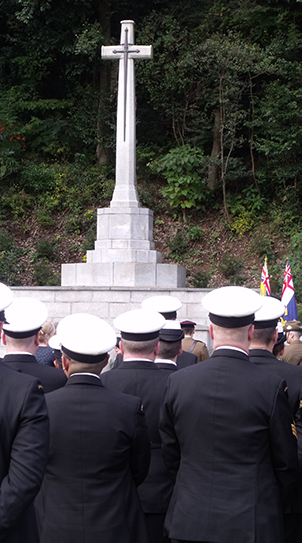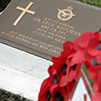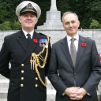 At cemeteries in France and Belgium, simple white headstones stand in long rows. Numbering in the hundreds of thousands, they mark the graves of British soldiers who lost their lives in World War I.
At cemeteries in France and Belgium, simple white headstones stand in long rows. Numbering in the hundreds of thousands, they mark the graves of British soldiers who lost their lives in World War I.
In Japan, in contrast, just a single grave—at the Commonwealth War Cemetery in Yokohama’s Hodogaya District—honours a British serviceman who died here during The Great War.
Colonel W.R. Morton was in the Royal Engineers and was serving as the military attaché to the British Embassy in Japan when he died on 27 November 1917, at the age of 56. Japan was allied with Britain in that conflict.
Personal connections
While the annual Remembrance Day ceremony on 11 November honoured every one of the 1,555 men of Commonwealth nations who are interred at the cemetery, the two minutes of silence—starting at precisely 11am—to mark 100 years since the end of World War I was particularly poignant for those who lost family in the conflict that was meant to be “the war to end all wars”.
Colonel Morton’s grave is identical to the others in the peaceful hilltop cemetery, and the brass plaque attached to the plinth gives his name, rank and regiment. Beneath, in a message from his family, are the words “Till he come”.
The colonel was the only British serviceman buried in Japan for well over two decades, until another global conflagration claimed millions more lives. Today, the cemetery is the last resting place of thousands of Allied servicemen.
The colonel lies in an immaculately tended plot, with rose bushes and lavender plants, flanked on both sides by plinths that bear the always sobering: “A soldier of the 1939–1945 war. Known unto God”.
Timely message
This year’s service was organised by the Embassy of New Zealand, Tokyo, with the traditionally strong turnout boosted further by about 100 crew from two Canadian warships—the destroyer HMCS Calgary and the navy supply ship Asterix—that were paying a port call to the US naval base at Yokosuka.
In his address, New Zealand Ambassador to Japan Stephen Payton paid tribute to “ordinary men and women who responded in extraordinary ways in extreme times” at the outbreak of hostilities in Europe in 1914, stepping forward to serve their countries in the summer of 1914 with the firm belief that they would be “home for Christmas”.
Payton added that four years of brutal conflict later saw the death toll among service personnel and civilians reach 16 million, and that many of those victims will never be found and lie in unknown graves at sea or on land, a long way from their homes. “The scale of their sacrifice is truly staggering”.
Lessons learned
Despite its billing as “the war to end all wars”, it was nothing of the sort, he said.
“It is timely here and today to acknowledge not only the losses and tragedy of war, but also the lessons of war”, he said, adding that it is our duty to ensure that the virtues that previous generations fought for—democracy, human rights, the rule of law, the right to live in dignity and free from tyranny—“are not eroded”.
Achieving that “is an important and essential tribute” to those who paid the ultimate sacrifice, the ambassador said.
Commemorative observances were delivered by representatives of the Anglican, Hindu, Islam and Buddhist faiths before Lieutenant Commander Colleen O’Brien read John McCrae’s poem “In Flanders Fields”.
After a reading of Laurence Binyon’s famous war poem “For the Fallen”, with its line “They shall not grow old”, the bugler sounded the “Last Post” before the traditional two minutes of silence. After the sounding of “Reveille”, representatives of embassies, the Japanese government and other organisations laid wreaths at the base of the Cross of Sacrifice as Scotland-born Frank Hunter played a series of laments on the bagpipes, including “Amazing Grace”.
The British Chamber of Commerce in Japan (BCCJ) was represented by Executive Director Lori Henderson MBE and Will Farquhar of Aston Martin Japan Ltd., who is a member of the BCCJ’s executive committee.
“I have been coming here every year since 2010, except for 2016 when I was in the UK, and I always went every year when I was growing up in the UK”, Farquhar told BCCJ ACUMEN.
“I’m from a military family and, although I never served myself, I had relatives in the forces and, therefore, attending the Remembrance Day service was something that we always did to pay our respects”.
The occasion is also a personal one, he said, as a close personal friend, Major Alexis Roberts, was killed in 2007 serving in Afghanistan with The Royal Gurkha Rifles, a regiment of the British Army.
“He is part of the reason that I am here, but I’m also here to make sure that all the other men and women who died serving their country are not forgotten”.




